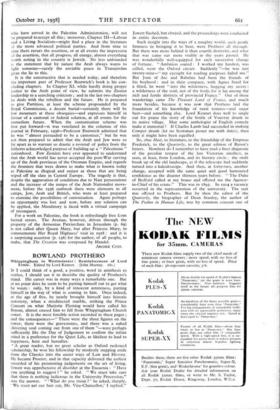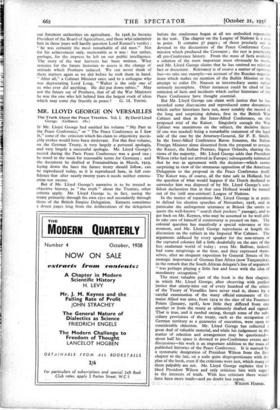Whippingham to Westminster : Reminiscences of Lord Ernie. Edited by
Lord Kennet. (John Murray. r8s.)
ROWLAND PROTHERO
IF I could think of a good, a positive, word in antithesis to restless, I should use it to describe the quality of Prothero's mind. His career was in many ways a remarkable one. But at no point 'does he seem to be putting himself out to get what he wants : only, by 'a kind of innocent astuteness, putting himself in the way of what is coming to him. Once indeed, at the age of five, he nearly brought himself into historic notoriety; when. a Misdirected marble, striking the Prince Ccinsort 'on what Marjorie Fleming would 'have called his Botom, almost caused him to fall from WhipPingham Church tower. It is the most forcible action recorded in these pages ; and the consequences—" There were the three figures on the tower, there were the gravestones, and there was a naked shivering soul coming out from one of them "—were perhaps sufficiently like the Day of Judgement to confirm the infant mind in a preference for the Quiet Life, as likeliest to lead to happiness, here and hereafter. • A great reader, but no great scholar as Oxford reckoned scholarship,'he won his fellowship by modestly stepping aside from the Classics into the easier ways of Law and History. He became Proctor, and in that capacity delivered the earliest recorded of his penetrating judgements on the art of.living. Jowett was apprehensive of disoider at the Encaenia : "'Have you anything, to suggest ? " he asked. " We must "take care that there is nothing-ludicrous in the University Procession," was the answer. " ' What do you- nieati7' he asked, sharply, We must ea our hair cut, 'Mr. Vice-Chancellor,' I replied."
Jowett flushed, but obeyed, and the proceedings were conducted in entire decorum.
Such insight into the ways of a naughty world, such gentle firmness in bringing it to bear, were Prothero all through. But there was more behind it than courtly dexterity, and what that was came out more visibly as the years passed. He was wonderfully well-equipped for each successive change of fortune. " Ambition soared : I worked my hardest, was called, went the Oxford circuit. Suddenly "—he was just twenty-nine" my eyesight for reading purposes failed me." But Joan of Arc and Rabelais had been the friends of his boyhood : and in their company, with Agnes Sorel for a third, he went " into the wilderness, hugging my secret : a wilderness of the soul, not of the body, for it lay among the rich and fertile districts of provincial France." Out of these wanderings came The Pleasant Land of France, and much more besides, because it was now that Prothero laid the foundation of his knowledge of rural tenures—and sugar beet—and something else. Lord Kennet does well to single out for praise the story of the bottle of Vouvray drunk in its native village. May some anthologist of English comedy make it immortal ! If Charles Lamb had succeeded in making Cowper drunk (let no Scotsman pester me with dates), then only it might have been equalled.
So, ohne Hast, to literature, to the friendship of the Empress Frederick, to the Quarterly, to the great edition of Byron's letters. Nowhere do I remember to have read a finer diagnosis of the peculiar temper of the late Victorian intellect, as seen, at least, from London, and its literary circle : the swift break up of the old landscape, as if the telescope had suddenly turned into a kaleidoscope. And then, at forty-two, another change, accepted with the same quiet and good humoured confidence as the disaster thirteen years before. " The Duke of Bedford called at my house and offered me the Agency- in-Chief of his estate." This was in 1893. In 1914 a vacancy occurred in the representation of the university. The seat was offered to Prothero. But by then the editor of the Quarterly, the biographer of Dean Stanley, the author of The Psalms in Human Life, was by common consent one of our foremost authorities on agriculture. In 1916 he became President of the Board of Agriculture, and those who remember him in those years will hardly question Lord Kennet's verdict : " he was certainly the most remarkable of old men." Not for his achievement only, memorable as it was : but rather, perhaps, for the impress he left on our public intelligence. The story of the war harvests has been written. -What remains for the future historian to assess is the change of attitude which Prothero induced. We can never think of these matters again as we did before he took them in hand. " After all," a Cabinet Minister once said to a colleague who was depreciating Lord Long, " Walter is the only one of us who ever did anything. He did put down rabies." May nor the future say of Prothero, that of all the War Ministers he was the one who left behind him the largest stock of ideas
which may some day fructify in peace ? G. M. YOUNG.
















































 Previous page
Previous page